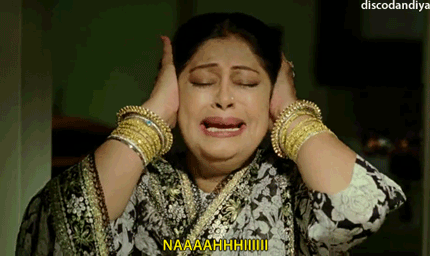As the Diwali week draws to a close, it’s time to look back on the memories you created this year, the people you met and celebrated with, the dress you wore for the special day, the decorations you and your loved ones painstakingly put up to beautify the house and last but the most important of them all (at least for me!) – the variety of delicacies you prepared and ate to celebrate the festival of lights.
From ladoos to barfi to halwa to gujiya…my mouth is still watering at the thought of these even though I stuffed myself on Diwali.
The streets and houses were filled with the aroma of the amazing food being prepared. But, did anyone realise that certain aspects of this festival might actually have prevented your senses from getting the maximum taste out of the sumptuous festive food that you love? No? Well, read on to find out why and how this might have happened:
Excessive noise prevents full enjoyment of food.

GIF courtesy of giphy.com
Whaaat? Yes! Believe it or not, but what you hear actually impacts the way you taste your food. A study by the Crossmodal Laboratory at Oxford University found that hearing high frequency notes enhances the sweetness and low frequency notes bring out the bitterness of the food one eats. The reason why restaurants are so particular about the music they play is because it not only influences the ambience but also the taste.
Another study published in 2011 found that loud background noise suppresses saltiness, sweetness and overall enjoyment of food. A 2011 report also found that noise quantum during Diwali is at 80 db for Delhi, 87 for Kolkata, 85 for Mumbai and 89 for Chennai. They are all above 80 db, the level at which sound becomes physically painful and food tasteless.
Air pollution means blocked nose… and blocked taste.

GIF courtesy of Giphy.com
Smell is the dominant sense in flavour appreciation. Various studies have proven how the smell of food determines how much flavour we get out of the said meal. How? Smells seem to come from the mouth, even though there are no cells there responsible for detecting scents. For example, the sensation of strawberry depends upon activation of smell cells located at the end of the nasal passage. The information gathered by these cells is relayed to the mouth via a process called olfactory referral.
You can try this for yourself too. Hold your nose and place a strawberry jelly bean in your mouth and chew. You should detect sweetness and a little sourness, along with the hard (and then soft) feeling of candy. With your nose held, however, you won’t notice the strawberry odour. Only when you let go, will you allow the odour molecules to travel through the nasal cavity to the smell cells, and suddenly the jelly bean will have strawberry flavour.
Man has evolved from caves, distinguishing between flavours as sweet or salty, to having five universal flavours – sweet and salty, and also sour, bitter and umami (savoury) and an infinite number of flavours which can be created with the help of ‘smell’.
But we lose this ability as soon as our primary organ responsible for this wonder – our nose – is hampered. A report by Centre for Science and Environment proved how air pollution increases by almost 10% during Diwali, which not only worsens the situation for people having breathing problems but may actually make a healthy person suffer from the same. And not just that, a research proves that polluted air severely changes the structure of the cells in the nasal tract for the worse. And this definitely not the kind of mutation that will give you the super powers your were looking for.
The more you stuffed yourself, the less flavorsome the stuff you stuffed yourself with.

GIF courtesy of Giphy.com
A major part of Diwali is dedicated to delicious mouth watering delicacies, but Diwali is not all about eating (believe me, I died a little writing this particular line, but what is true is well…true).
Festivals are a time when you will overeat. From not having time to exercise, your food schedule having gone haywire in the preparations and meeting people, to people around you gulping down food faster than you can say “Spoon” (You see what I did there? Hehe.) and forcing you to eat the last piece of ladoo and barfi – overeating has been accomplished.
But overeating sweet dishes would not just have added a sweet amount of bulk around your body, but would have also made the food you eat less flavoursome and hence less enjoyable for you as you continued to eat.

GIF courtesy of Tumblr.com
Did that happen? Think about it…
Basically the more you eat, the more numb your taste buds get, until finally you are only eating for the sake of eating.
When you continue to eat and eat, your tongue and your stomach figuratively lose the sense of when to stop. Like how living in certain conditions makes you habitual of them until you become indifferent to the cold or the warmth of the place. Similarly your body becomes habitual to overeating and hence you go on and on. An article by scientificamerican.com actually explained how an overeater is created or “engineered”.
All’s not lost, yet…
But the silver lining in case of the above problems is that all of them could have been, and in future can be, prevented by you. You can burst less crackers and educate others to do the same. You can avoid air and noise pollution and hence have a cleaner and greener Diwali. This way you can also enjoy your food better. In terms of overeating – better start now. The damage has been done, so time to watch the calorie intake and make up for the missed workout. But don’t push yourself too hard because festivals are a time to let go. And remember, excess of everything (even food, as proven above) is bad for you.
So time to get started on the post-Diwali activities, folks! Catch up with work, exercise, life and whatever you had left off while in the Diwali bubble.


